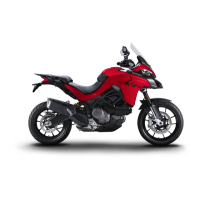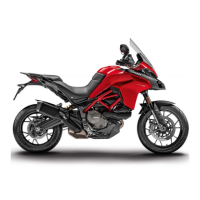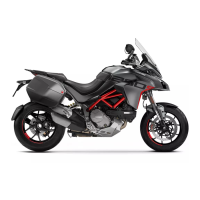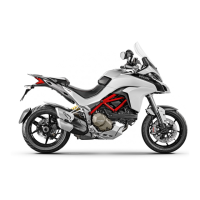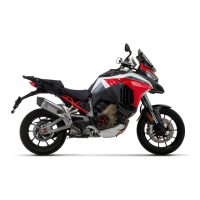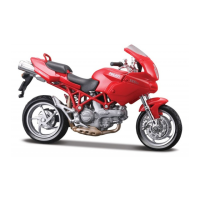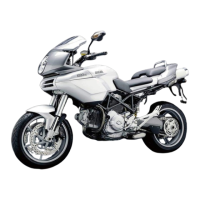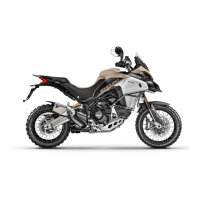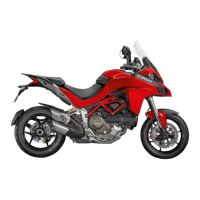Do you have a question about the Ducati MULTISTRADA V4 and is the answer not in the manual?
Details on the scope and coverage of the Ducati Card Assistance Programme with ACI Global Services.
Lists the specific services covered by roadside assistance, including towing and transport.
Provides a comprehensive list of phone numbers for roadside assistance across various countries.
Emphasizes rider's ultimate responsibility for safe driving, even with advanced rider assistance systems.
Explains that adaptive systems have limitations and may provide incorrect information based on context.
Highlights distraction as a primary cause of accidents and stresses maintaining control.
Lists common acronyms and abbreviations used throughout the owner's manual for clarity.
Provides essential advice for safe riding, motorcycle care, and referencing service centers.
Explains the meaning of different warning symbols (Attention, Important, Note) used in the manual.
Defines the designed purpose of the motorcycle, including limitations on off-road and towing use.
Specifies maximum permitted weights for the motorcycle and its accessories like side bags.
Details legal obligations such as holding a valid license, helmet use, and insurance.
Stresses the importance of rider training and wearing proper protective riding gear for safety.
Offers crucial tips for safe operation, including pre-ride checks and proper riding posture.
Provides guidance on safe refuelling practices and explains the fuel compatibility label (E10).
Details how to properly load the motorcycle to maintain stability and safety.
Highlights hazards associated with used engine oil, brake fluid, and coolant.
Warns about explosive gases from the battery and precautions during charging.
Explains how to find the unique VIN for identifying the motorcycle model and ordering parts.
Details the location and importance of the engine identification number for spare parts.
Lists the standard equipment included with the Multistrada V4 model.
Identifies key components and their locations on the motorcycle through a diagram.
Provides instructions on how to open and close the fuel tank filler plug.
Explains how to use the seat lock to remove the passenger and rider seats.
Describes the motorcycle's Bluetooth system and compatibility with various devices.
Details the location and usage of the 12V power outlets and battery caution.
Provides instructions on using the side stand safely and its maintenance.
Guides on how to attach and detach the optional side bags accessory.
Explains how to open, close, and load the side panniers with light luggage.
Details the motorcycle's USB port for charging and its limitations.
Instructions on how to adjust the windscreen height safely while the motorcycle is stopped.
Guide to adjusting rebound, compression, and spring preload on the front fork.
Details on adjusting the rear shock absorber for compression, rebound, and spring preload.
Identifies and explains the function of various controls on the motorcycle's handlebars.
Explains the operation of different buttons and switches on the handlebar controls.
Describes the key positions for ignition, lights, and steering lock.
Details on how to adjust the clutch lever distance and its proper usage.
Information about the motorcycle keys, immobilizer system, and duplicate key procedures.
Explains the function of the throttle twistgrip on the right handlebar.
Details on operating and adjusting the front brake lever for optimal distance.
Describes how to operate the rear brake pedal and its hydraulic system.
Explains how to use the gear change pedal for shifting gears.
Guidance on adjusting the position of the gear and rear brake pedals for rider comfort.
Guidelines for the initial running-in period of the motorcycle for optimal performance.
A comprehensive checklist of essential checks to perform before riding the motorcycle.
Explains the ABS warning light behavior and device checks for proper system function.
Step-by-step instructions for starting and stopping the motorcycle engine safely.
Guidance on smoothly moving off, shifting gears, and avoiding common riding errors.
Procedure for temporarily restoring motorcycle operation using a PIN code in case of malfunction.
Details on correct braking techniques, ABS functionality, and emergency braking.
Instructions on how to safely stop the motorcycle and engage the parking light and steering lock.
Guidelines for safe refuelling, including fuel type recommendations and warnings.
Specifies maximum permitted weight and speed variations based on load configuration.
Highlights hazards associated with used engine oil, brake fluid, and coolant.
Instructions for removing, charging, and refitting the motorcycle battery safely.
Guidance on checking and adjusting the drive chain tension for optimal performance and safety.
Detailed steps for cleaning and lubricating the drive chain to ensure longevity and performance.
Procedure for checking and adjusting the motorcycle's headlight aim for proper visibility.
Instructions on how to manually adjust the rear-view mirrors for optimal viewing.
Guidance on checking tyre pressure, repair, replacement, and wheel balancing.
Step-by-step instructions for checking and topping up the engine oil level.
Information on the importance of spark plugs and when to have them replaced.
Best practices for washing and cleaning the motorcycle to preserve its finish and components.
Description of the motorcycle's TFT instrument panel and its customization features.
Detailed explanation of various warning lights, their descriptions, and associated colors.
Information on system status messages and how the panel handles active warnings.
Lists and describes the various information elements available on the main screen display.
Explains the engine coolant temperature display range, warnings, and overheating procedures.
Guide to navigating the interactive menu and info display using handlebar controls.
Details on the four available Riding Modes and how to customize their associated parameters.
Explanation of the rev counter, virtual RPM limiter, and shift-up warnings.
Lists available trip meters and how to change units of measurement for trip information.
Instructions on how to reset trip meter data for Trip 1 and Trip 2.
Explanation of Cruise Control functionality, usage conditions, and speed settings.
Guidance on what to do if the Cruise Control system encounters faults or malfunctions.
Details on connecting and managing Bluetooth devices like smartphones and intercoms.
Instructions on using the lap timer function for recording lap times in Sport Riding Mode.
Guide to adjusting ABS intervention levels and disabling the system in Enduro Riding Mode.
Explanation of the Trip Master function for calculating partial distances and its modes.
Details on accessing call lists, making calls, and handling incoming calls via Bluetooth.
Instructions on controlling the music player through the infotainment system.
Overview of the Setting menu and how to navigate through its various options.
Guide to customizing parameters like Engine, DTC, ABS, DWC, and DQS for each Riding Mode.
Instructions on adjusting the engine power output to High, Medium, or Low levels.
Guide to setting the Ducati Traction Control intervention level for various riding conditions.
Details on adjusting ABS intervention levels, including OFF, for different riding modes.
Explanation of how to set the Ducati Wheelie Control intervention level for various riding scenarios.
Instructions on activating or deactivating the Ducati Quick Shift system for seamless gear changes.
Procedure to reset Riding Mode parameters to factory default settings.
Guide to changing the order of travel information displayed in the Info display.
Instructions on changing the fuel level display between graduated bar or remaining distance.
How to set the Daytime Running Lights status to automatic or manual mode.
Guide to setting the display's day/night mode and adjusting backlight intensity.
Instructions on activating, setting, and modifying the motorcycle's PIN code for security.
Guide to setting the date, time, and their respective display formats.
Information on displaying upcoming service reminders and types of service coupons.
Instructions for enabling/disabling the Lap function, viewing, and deleting recorded lap data.
Guide on performing tyre calibration and teaching the rolling circumference.
Instructions for pairing new Bluetooth devices and managing already paired devices.
How to set turn indicators to automatic or manual mode for turn signal switch-off.
Guide to setting units for speed, temperature, and consumption displayed on the panel.
Explanation of the VHC system for holding the motorcycle at a standstill and its activation.
Details on how the instrument panel indicates when the motorcycle is due for service.
Explanation of how the instrument panel manages and displays various warnings and alarms.
Instructions on operating low/high beams, DRLs, and fog lights.
Details on activating, deactivating, and the automatic switch-off feature of turn indicators.
Instructions on how to activate or deactivate hazard lights and their behavior.
Procedure for checking and topping up the engine coolant level in the expansion reservoir.
Guidance on checking brake and clutch fluid levels and the importance of maintaining them.
Checks for brake lever/pedal clearance, clutch play, and fluid levels.
Instructions on inspecting brake pads for wear and when replacement is necessary.
Advice on maintaining battery charge using a maintainer and precautions against sulphation.
Specifications for overall, dry, and maximum allowed weights of the motorcycle.
Detailed dimensions of the motorcycle including length, height, and width.
Specifications for fuel, oil, brake fluid, and front fork fluid capacities and types.
Details on the engine's bore, stroke, displacement, compression ratio, power, and torque.
Information on maximum speed, spark plug type, fuel system, and brake specifications.
Technical specifications for front and rear brake discs, calipers, and master cylinders.
Details on the clutch, gearbox ratios, drive chain, and wheel alignment.
Information on the frame construction, steering geometry, and wheel types.
Details on tyre types, sizes, pressure recommendations, and minimum tread depth.
Specifications for the front fork and rear shock absorber, including adjustability.
Description of the exhaust system and the available paint colors for the motorcycle.
Lists basic electric items including dashboard, headlights, indicators, and battery.
Identifies fuse box locations and provides a key to understand fuse functions and ratings.
A logbook section to record scheduled maintenance services performed on the motorcycle.
Information regarding EU directives and manufacturer addresses for radio equipment.
| Displacement | 1, 158 cc |
|---|---|
| Power | 170 hp (125 kW) @ 10, 500 rpm |
| Torque | 125 Nm (92 lb-ft) @ 8, 750 rpm |
| Transmission | 6-speed with Ducati Quick Shift (DQS) up/down |
| Bore x Stroke | 83 mm x 53.5 mm |
| Compression Ratio | 14:1 |
| Front Wheel Travel | 170 mm (6.7 in) |
| Rear Wheel Travel | 180 mm (7.1 in) |
| Front Tire | 120/70 ZR19 |
| Rear Tire | 170/60 ZR17 |
| Wheelbase | 1, 567 mm (61.7 in) |
| Dry Weight | 215 kg (474 lb) |
| Curb Weight | 240 kg (529 lb) |
| Fuel Capacity | 22 l (5.8 US gal) |
| Engine Type | V4 Granturismo, 4-cylinder, liquid-cooled |
| Fuel Injection | Electronic fuel injection system, Øeq 46 mm throttle bodies |
| Exhaust | Single stainless steel muffler with catalytic converter and 2 lambda probes |
| Final Drive | Chain |
| Frame | Aluminum monocoque |
| Front Brake | 2 x Ø 330 mm semi-floating discs, radially mounted Brembo Monobloc 4-piston calipers |
| Rear Brake | Ø 265 mm disc, 2-piston caliper |
| Seat Height | Adjustable 840-860 mm (33.1-33.9 in) |
| Safety Equipment | Cornering ABS, Ducati Traction Control |
| Standard Equipment | Cruise Control, TFT color display |

